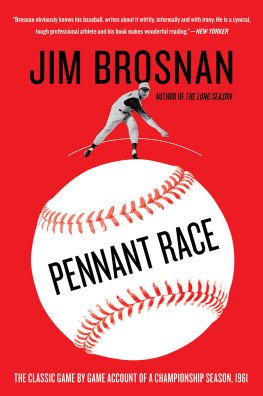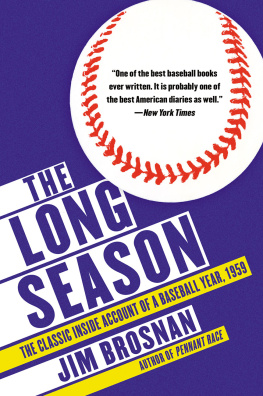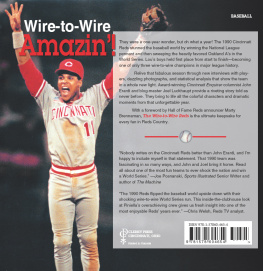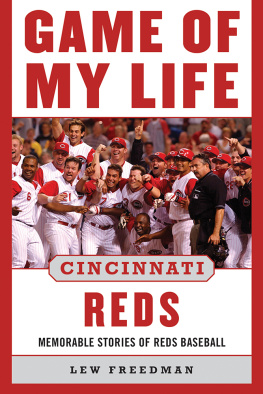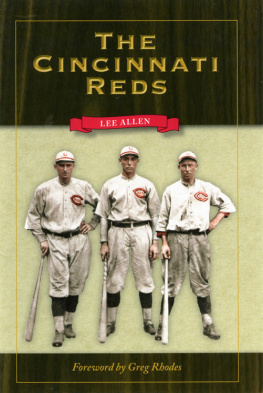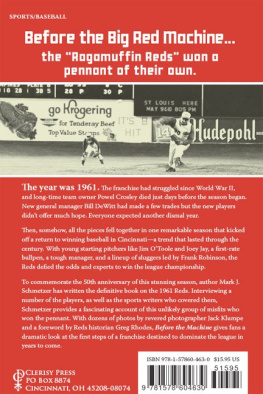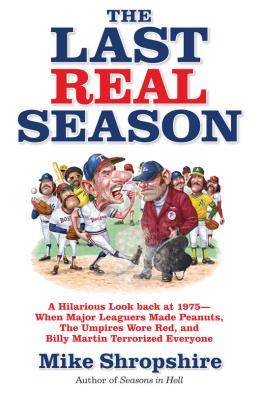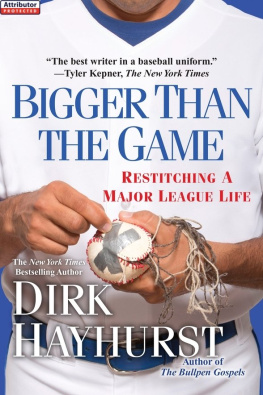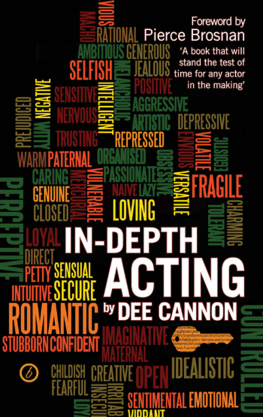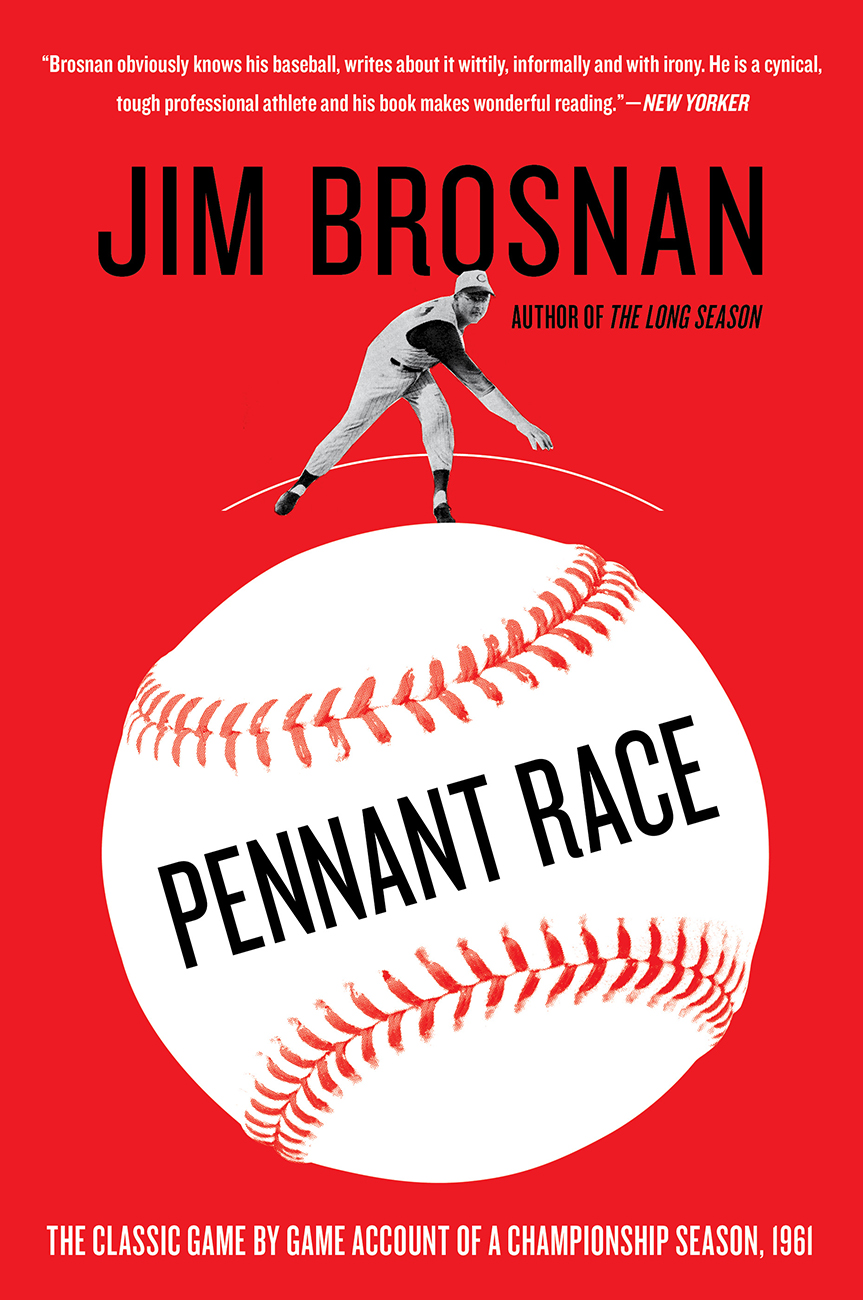Contents
Guide
Critics of major league baseball claim it is a dull game. Nothing ever happens, they say. Theres nothing new in baseball. You see one game youve seen them all.
Major league ballplayers claim that theirs is a tough, challenging profession, for: You learn something new every day.
The fans-eye view is limited; yet he always thinks he knows whats going on. (If hes not sure, he tunes in on a broadcaster or telecaster who is positive that he knows whats going on.)
The veteran professional ballplayer is never sure of what will happen in any given play on any given day. When hes wrong he desperately calls it percentage or the breaks; when hes right he modestly calls it experience. His life is extremely rewarding when he wins, extremely frustrating if he loses. On and off the field he finds that every day has its moments if he swings with it. The pleasant, and unpleasant, nuances are carefully treasured, not easily forgotten.
This journal is my attempt to record the daily, game-by-game lives of the Cincinnati Reds during 1961. Some of it was written under the influence of success. Never taken seriously as pennant contenders, the Reds found ways and means to win often enough in the season of 61. How and why they won the pennant is the subject of my book.
Pennants are won as games are played, but baseball life stands out in a series of episodes, or recollections of the scheduled series as they succeed each other during the season. There are varying degrees of disappointment in the life of a ballplayer, for even on a pennant winner he must lose 35 percent of the time. Each game has its moments and a pennant-winning seasonful presents a memorable kaleidoscope.
This journal is as accurate as I could make it, using daily notes and my own fallible observations. Myopia and a begrudging cynicism may have obscured the flag from my sight until the last out of the final, pennant-clinching game. It was really there then; and it is really here now, dedicated to the men who made it worthwhile.
L IKE most baseball seasons in Cincinnati the 1961 National League schedule opened to the optimistic applause of a packed house at Crosley Field. The encouraging shouts of the Red bench echoed throughout the stands as eight white-uniformed Reds rushed onto the field, followed more leisurely by the pitcher starting the first game of the year. For all of us, as hopefully expectant as the crowd, the symbolic opening bell rang loud and clear.
Earlier in the day the pregame clubhouse meeting had been postponed till one oclockafter we hit, said Fred Hutchinson. Gave him more time to think of something to say. Hutch, in the throes of uplifting oratory, tends to mumble, verbally. His gestures are vehement, his hands gripping the tension and flexing the atmosphere almost tangibly. His eyes urgently seek and push. His words seep through clenched teeth, baffling the avidly attentive ear.
Hed made one dramatic appeal, as forcefully pleading as he can get, during the Meet The Reds luncheon the day before. Hutch concluded his analysis of the clubs hopes by saying, Im putting the burden on our young pitchers. Of course they can take it, I think. Theyve got great arms, great desire, great potential. Well go as far as they can take us.
In the clubhouse before the game he said, simply, This is it. You know it. Wish you all a good year. Lets go get em.
Ask a pro how he feels on Opening Day, hell say, I feel... uh, great. Why not? Great day for a ball game. Then hell rush around the clubhouse shaking hands, urging each teammate to Have a good season!
Six weeks of spring training had given little indication that a good season was in prospect. After one particularly inept performance in mid-March the new general manager, Bill DeWitt, had said, If Id seen some of these guys play before they talked contract with me, I might have signed them for less money!
Hot, sunny days and balmy nights in Tampa may have contributed to the miasma that affected the Reds in the first twenty games of the spring training schedule. Florida weather is not usually so pleasantspring training, 1961, had elements of a vacation, even for ballplayers.
After we broke camp on April 4, and headed north, the weather turned bad and the Reds started to play well. The starting pitchers, especially Jim OToole, shook the soreness from their arms, lengthened their strides, and jammed the ball down the Milwaukee batters throats. Bill Henry, the skinny left-hander from Texas, threw as hard as anyone could expect and encouraged Hutchinson to predict wed have the strongest bullpen in the league.
We had a four-game winning streak when we arrived in Cincinnati to open the season, and even DeWitt was convinced that the Reds not only would show up for every scheduled game but would even win a few before October.
Young OToole shouldered the load for the first of the 154 steps along the 1961 National League tour. Jims a bit too cocky to be nervous, youd say; but he had failed to hit a ball out of the cage during his batting practice, causing Bill Henry to yell at him from center field, Put the bat down, OToole. Youre making me sick!
OToole looked better with the warm-up ball in his hands, kneading it quietly while one hundred and one photographers bustled about the dugout snapping pictures of other photographers taking pictures of ballplayers smiling slightly green smiles. As we lined up along the third base line for the pregame introduction, OToole stared at the minute hand of the scoreboard clock and asked me, Dont you think I should warm up? You didnt wait for all this crap to finish, did ya?
Go ahead, I guess, I urged him. Get hot. And try to go farther than I did last year. (Although Id thrown the first pitch of the 1960 season I watched most of that Opening Day game on TV, after the second inning. Nerves, of course. Im only half-Irish.)
OToole is as brash as Brendan Behan himself and he brushed the Chicago Cub batters aside as if they were tee-totaling drama critics. The season was hardly an hour old before Robinson and Post had hit home runs for us. OToole himself had lined two singles over shortstop and Henrys sarcasm had turned to chuckles. It isnt every day that a bullpenner gets a chance to laugh. Most days we work, running down to the bullpen mound, hushing stomach butterflies, and cursing the lousy starting pitchers who get four days rest between assignments and cant go five innings without getting into trouble.
In the sixth inning OToole had a six-run lead to go with his self-confidence. It was hardly necessary for Henry and me to warm up in the ninth inning.
You should hit so well as Tootie this year, I said to Henry.
You should pitch so good, he retorted.
All in all, it was a pretty dull Opening Day game. Dont know why OToole was so excited after the ninth inning had ended. He damn near kissed Post in the clubhouse, where two celebrations were carried on simultaneously, one for the win, and another, even more pleasant: we would be allowed beer in the clubhouse during the 1961 season!
Even the peanut vendors, wearing stovepipe hats and pushing their dilapidated carts down Dalton Street couldnt have sung happier work songs.
Elvin Tappe, the Cubs coach, had one sharp comment on the game:
! (He said it quietly, though.)
The only good thing about a cold spring day at the ball park is the pitchers heart-warming sight of the flag blowing in from center field. Takes a brisk wind to hold todays lively ball inside the park. So, blow, noreaster, blow.
On the other hand, cold days usually follow or concur with rain showers, and the soggy, spring-green grass of the outfield makes pregame practice gingerly distasteful footwise. Extra-thick inner soles plus two pair of socks cant keep the damp cold out. The clubhouse consensus is usually, and was on this, our second, day, They cant be serious, can they, about playing this contest?

